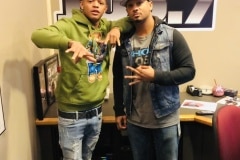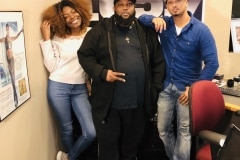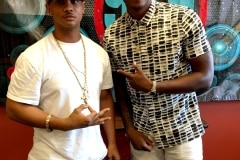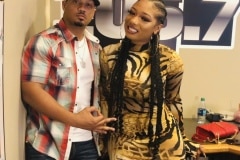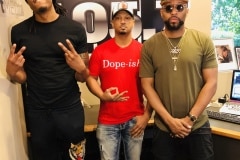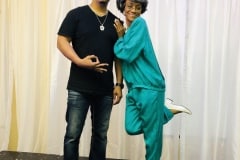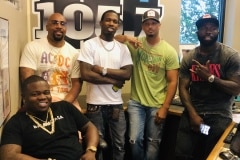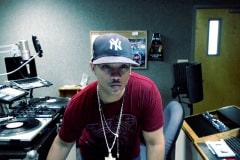MICHELLE Talk New Album, the Queer Cultural Shift and Hairography
Written by djfrosty on September 27, 2024
As their third album arrives, New York collective MICHELLE is leaning into boy bands and girl groups for inspiration.
It’s not that their latest, Songs About You Specifically out today via Transgressive Records, particularly sounds like One Direction, Spice Girls or Fifth Harmony, but examples of modern pop with four lead vocalists are hard to come by outside those groups.
“When you’re trying to learn vocal arrangements and trying to reference music that also has this many vocals, the only music you can find are these girl bands,” says Julian Kaufman, who, along with Charlie Kilgore, handles much of the production in the band. “There are girl bands like The Shirelles from the ‘50s and ‘60s that are a singing a little more vintage pop and that’s great. But in the last 30 years, all you really get is the *NSYNCs and the Fifth Harmonies of the world.”
On Songs About You Specifically, tapping into those inspirations has led to all the voices of MICHELLE singing out in crisp clarity on songs collectively written in the small town of Ojai, Calif. outside of Los Angeles.
Trending on Billboard
Unlike their previous releases (2018’s HEATWAVE and 2022’s After Dinner We Talk Dreams), their third studio album does not divvy up songs by each singer and features multiple vocalists on each track, which adds a richness to the sextet’s unique brand of indie pop.
“We try very hard to make sure everybody sounds different,” says Kaufman, adding they have the vocalists (Sofia D’Angelo, Layla Ku, Emma Lee, and Jamee Lockard) sing on different mics and took inspiration from mid 2010’s hip-hop where features took on extremely different resonances when they were recorded separately and stitched together in a studio. “[We were] making sure that each singer has a slightly different sense of harmony. The first verse of ‘The Dropout’ and the second verse of the song have the same melody, but one is sung by Layla and one is sung by Jamee and the harmony stacks they sing are different… Can you hear any of this stuff? No, but it all adds up to subtle things in your brain.”
While some contemporary artists might scoff at the bubblegum pop comparisons, D’Angelo loves it. “Wait, so when you listen to MICHELLE, are you like, ‘Oh my god, that’s Emma. Oh my god, that’s Jamee. Oh my god, that’s Layla. Oh my god, that’s Sofia’? Hell yeah,” she says. “I’m freaking out about this, because this is what I would do with One Direction.”
MICHELLE is also leaning into the stage presence of the major pop acts. While a MICHELLE show has never lacked energy, Ku says people can expect more elaborate choreography. “Shout out to overlord Lee. She choreographs everything with great intent,” Ku says. “We’ve been putting so much work into this dancing element of our performance. It’s become very visually pleasing. I see videos of us dancing and I’m like, ‘Yeah, we ate that up.’”
Audiences can also expect live drums, coordinated outfits (not matching just yet, but they tease the possibility) and lots of hairography.
“The last two shows we did [on the Still Woozy tour] we had wind machines or fans at the edge of the stage. Oh boy, did that make a difference,” says Lee. “You’re like, this is just where I stand to sing and then you see a video and…it’s life changing.”
“Those experiences when the fan was in my hair made me realize this is what I’ve always wanted to do for my whole life. This is what I would do with the hair dryer in my bathroom when I was a kid singing Miley Cyrus or Britney Spears or Beyoncé or whatever,” says D’Angelo. “The hair is really the fifth vocalist, the fifth dancer in the band.”
When the group was recording the new record in Ojai, they would split up into writing groups of two or three and whichever group finished their track first would make dinner for everyone else. Having six writers, all from varying backgrounds, genders, sexualities and styles gives MICHELLE the rare ability to create honest music from many perspectives.
“It’s so exciting that we can write about queer relationships or maybe an experience that only two of the members have had, but we can present it under [MICHELLE],” says Lee. “We have this vessel to constantly be tons of different things that are true to different parts of the group.”
MICHELLE has successfully avoided being pigeonholed as just a queer band or just a pop group over the past six years, as their sound has evolved and changed. For their latest, direct inspiration is extremely difficult to pinpoint. There are the ‘90s R&B sounds on “Akira” and the beachy breeziness of “Cathy.” There are traces of late 2000s and early 2010s indie like Phantogram and Phoenix, alongside consistently strong basslines and danceable drumbeats.
“Sonically, it is not very clear what genre this
is. That is something we were going for,” says Kaufman. “We were trying to have that thing where you put on this album and it’s not exactly just another pop album. This is MICHELLE. That’s the intention.”“When we went into writing we wanted to experience catharsis and really express ourselves,” says D’Angelo. “With this record, it was anything goes in terms of what we were bringing into the room. The focus was just crafting great music, helping each other. If someone had an idea, being there for them.”
The group has always billed themselves as a predominantly queer collective and, as the culture embraces LGBTQIA+ artists like Chappell Roan, MUNA, Reneé Rapp, Janelle Monáe and more, MICHELLE sees this as a turning point for queer representation.
“Queer people aren’t going anywhere. Lesbians aren’t going anywhere,” says Lockard. “We finally reached a moment in pop culture where queer people feel comfortable sharing who they are and it’s being well received. It’s just going to continue to grow as younger queer listeners are hearing these artists and writing their own stories.”
“The only element of this moment that I’m looking forward to ending….” Ku adds — pausing while her bandmates laugh, in order to reassure, “Everyone’s going to be like, ‘I feel that’ at the end of my sentence. Don’t worry.
“Whenever there’s rumblings of a cultural shift with young people, there is a quick [instinct to] vulture, to prey, swarm, that companies hop on,” she continues. “The music industry is a huge perpetrator of that — and I look forward to when the commodification of queer aesthetic and art comes to a close. So many of our queer musical predecessors did it in anonymity for so long, and I look forward to when it’s just music and stories being told by these people are accepted and understood to be regular rather than something to profit off of.”

 State Champ Radio
State Champ Radio 
